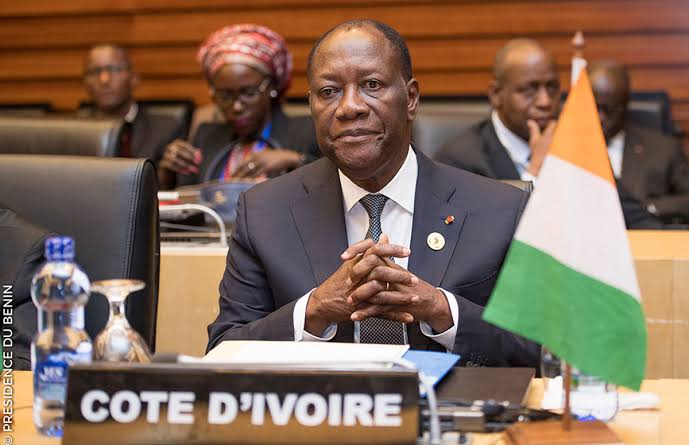Fact-Check: Did France Unilaterally Decide to Withdraw Troops from Côte d’Ivoire?

BY Mustapha Lawal
Claim:
An X (formerly Twitter) user claims that Côte d’Ivoire’s President Alassane Ouattara did not request French troops to leave the country. Instead, it alleges that France unilaterally decided to withdraw its forces as part of a strategic shift in its military presence in Africa, citing broader foreign policy changes under French President Emmanuel Macron.
Verdict:
Misleading. While France has announced a reduction of its military footprint in Africa, Côte d’Ivoire’s President Alassane Ouattara publicly requested the withdrawal of French troops, framing it as a sovereign decision.
Full Text
A recent tweet by an X user, Farida_N, asserts that French troops’ withdrawal from Côte d’Ivoire is not the result of a request by the Ivorian government but rather part of France’s strategic repositioning. The post accuses President Ouattara of being excessively loyal to France and dismisses his announcement as insincere, claiming it is part of a deceptive French agenda to maintain covert control over its former colonies.
The withdrawal of French troops has been a topic of intense scrutiny, particularly given the increasing anti-French sentiment in West Africa. In a speech on November 6, 2024, President Ouattara stated that his government had formally requested the withdrawal of French forces by 2025. However, critics argue that this move aligns closely with France’s own plans, announced earlier by President Macron, to reduce its military presence in Francophone Africa.
Several of France’s former colonies have experienced military coups in recent years, notably two within one year in Mali (August 2020 and May 2021), in Burkina Faso in 2022 and Niger in 2023.
French troops withdrew from Mali, Burkina Faso, and Niger in 2022 and 2023 after the military juntas in these countries severed defence agreements with the former colonial power. This was followed by a rise in anti-French sentiment and a pivot towards alternative allies like Russia.
The last French troops left Mali and the Central African Republic in 2022 and Burkina Faso in 2023. France began withdrawing jets and troops from Chad at the end of 2024 after the country’s military leader cut military ties. Senegal made a similar request in November, which was formalised in the new year.
Verification
France’s Announced Strategic Shift:
France’s evolving military strategy in Africa was outlined by President Macron in 2023. He announced plans to significantly reduce troop numbers across several countries, including Côte d’Ivoire, Gabon, Senegal, and Chad. The French government framed this as a shift toward a more collaborative and modernized approach, emphasizing capacity-building for African forces rather than direct military intervention.
Reports from sources like France24 and Al Jazeera confirm that these plans have been in the works for months, with French officials citing the need to recalibrate their presence following rising hostility in countries like Mali and Burkina Faso.
Jean-Marie Bockel, President Emmanuel Macron’s special envoy to Africa, submitted a report in November on the evolution of France’s military role on the continent. While the report has not been made public, the Elysée Palace stated in a press release that it advocated for a “renewed” and “co-constructed” partnership with African nations.
“The recommendations are in line with the desire to implement a renewed defence partnership that meets the needs expressed by our partners and is co-constructed with them, while fully respecting their sovereignty,” the presidency added.
Sources told AFP that the report suggested significant reductions in troop levels across French bases in Africa. Over the past decade, France has been forced out of more than 70 percent of the African nations where it previously maintained a military presence. Today, its forces are largely confined to Djibouti, with 1,500 soldiers, and Gabon, with a little over 350 troops.
“For our partners, what matters tomorrow is not the number of soldiers. There will be the personnel needed to make it work. What matters is the quality of the partnership we are going to build together for the world to come,” Bockel said in an interview with FRANCE 24.
Côte d’Ivoire’s Position
In a televised address, President Ouattara emphasized that his government initiated the request for troop withdrawal, underscoring Côte d’Ivoire’s sovereignty. This statement came amid growing regional sentiment against foreign military bases. Ouattara described the decision as a step toward reinforcing Côte d’Ivoire’s defence capabilities independently.
French forces will begin withdrawing from Ivory Coast starting in January, President Alassane Ouattara said on Tuesday, December 31st 2024, marking another step in the former colonial power’s military retreat from West Africa.
In a televised year-end address, Ouattara said the departure was a result of Ivory Coast’s growing military capabilities.
“We can be proud of our army, whose modernisation is now complete,” he said. “In this context, we have decided on the coordinated and organised withdrawal of French forces.”
The French troops stationed at the 43rd BIMA marine infantry battalion in Abidjan’s Port-Bouet suburb, comprising some 600 soldiers, will hand over the base to Ivorian forces this month, Ouattara added.
This aligns with broader regional trends, where governments are navigating complex relationships with France amid rising nationalism and demands for greater autonomy.
The Historical Context
France’s withdrawals have also drawn criticism from African countries. Mali, Burkina Faso and Niger have accused the French government of attempting to mask its “neocolonial inclinations”. Critics of the withdrawal highlighted France’s historical influence over its former colonies, citing instances of covert control under the guise of partnership. They argue that troop reductions do not necessarily signal an end to French influence but could signify a shift toward less visible methods of exerting control, such as economic leverage and diplomatic channels.
In a joint statement released in late December, the military rulers of these countries described the closure of French bases as “trickery” aimed at “carrying out destabilising actions”.
“The French imperialist junta, feeling its interests threatened, supported by certain heads of state in the sub-region, is desperately trying to bring the emancipatory dynamic to a halt,” they said.
Analysis of the Claim
While it is true that France announced its intent to reduce its military presence in several African countries, including Côte d’Ivoire, President Ouattara’s government also explicitly requested the withdrawal. These overlapping timelines have fueled speculation about the true driver of the decision.
The claim that Ouattara remains a staunch ally of France and operates under its influence is subjective and lacks concrete evidence in this context. However, the broader narrative of France adapting its strategies to maintain influence aligns with historical patterns of Franco-African relations.
Conclusion
The claim that Côte d’Ivoire’s President did not request the withdrawal of French troops and that the decision was solely France’s strategic choice is misleading. While France has a clear agenda to reduce its visible military presence, Côte d’Ivoire’s government has also taken an active role in advocating for the withdrawal as a sovereign decision.
This highlights the complex interplay of national sovereignty and historical influence in the evolving dynamics between African nations and their former colonizer. As the situation develops, it remains crucial to analyze official statements and actions critically to separate political rhetoric from substantive policy shifts.




